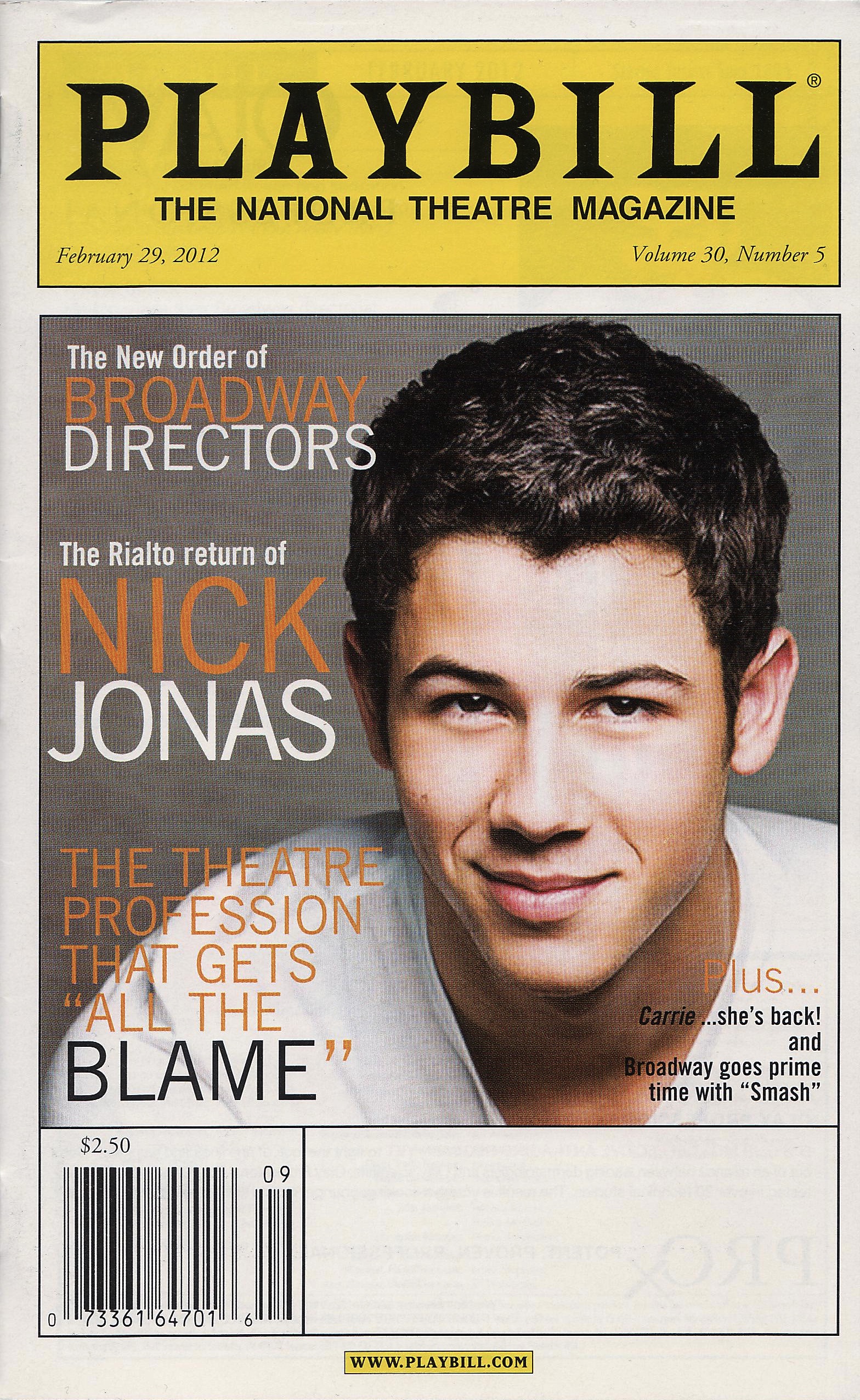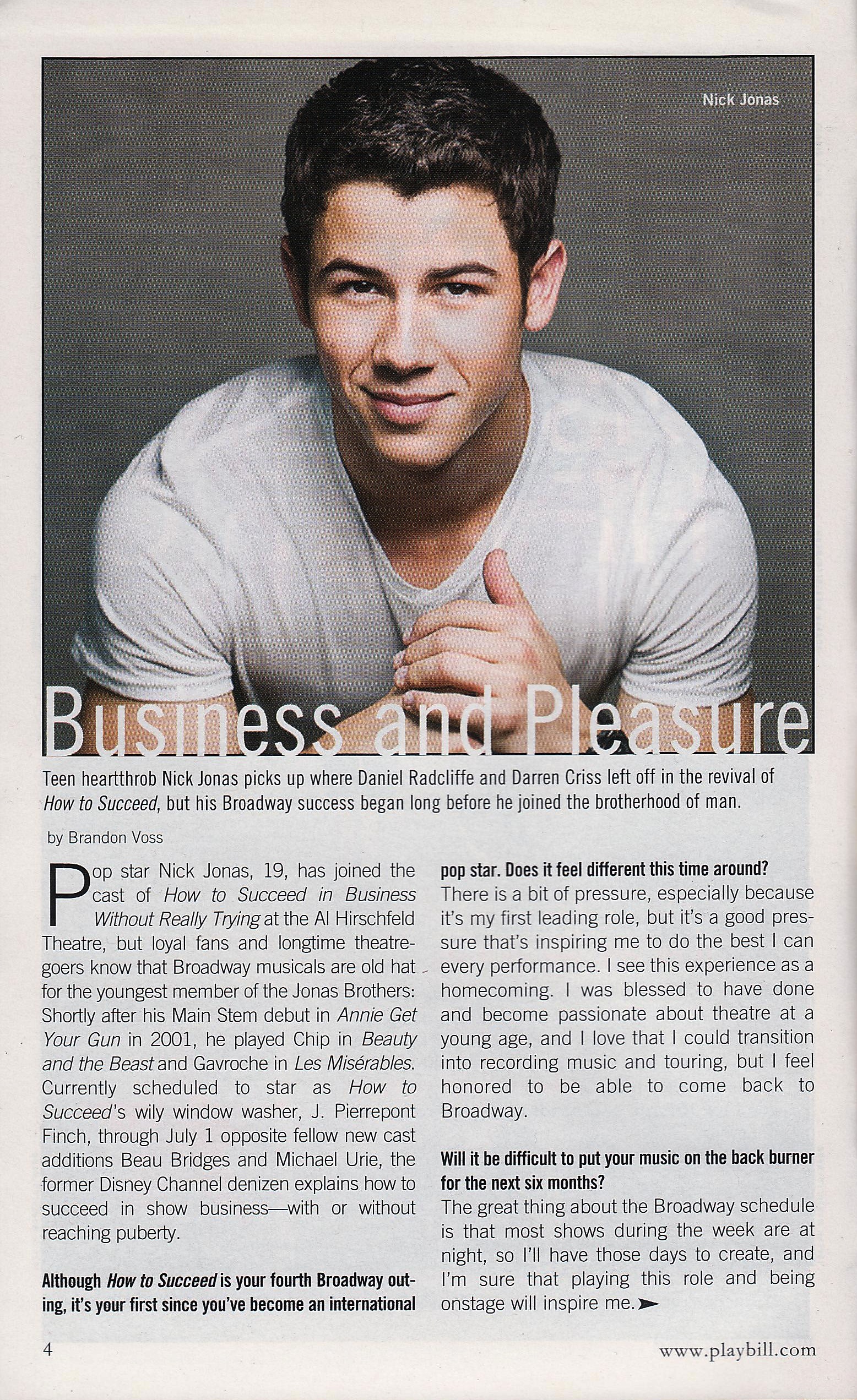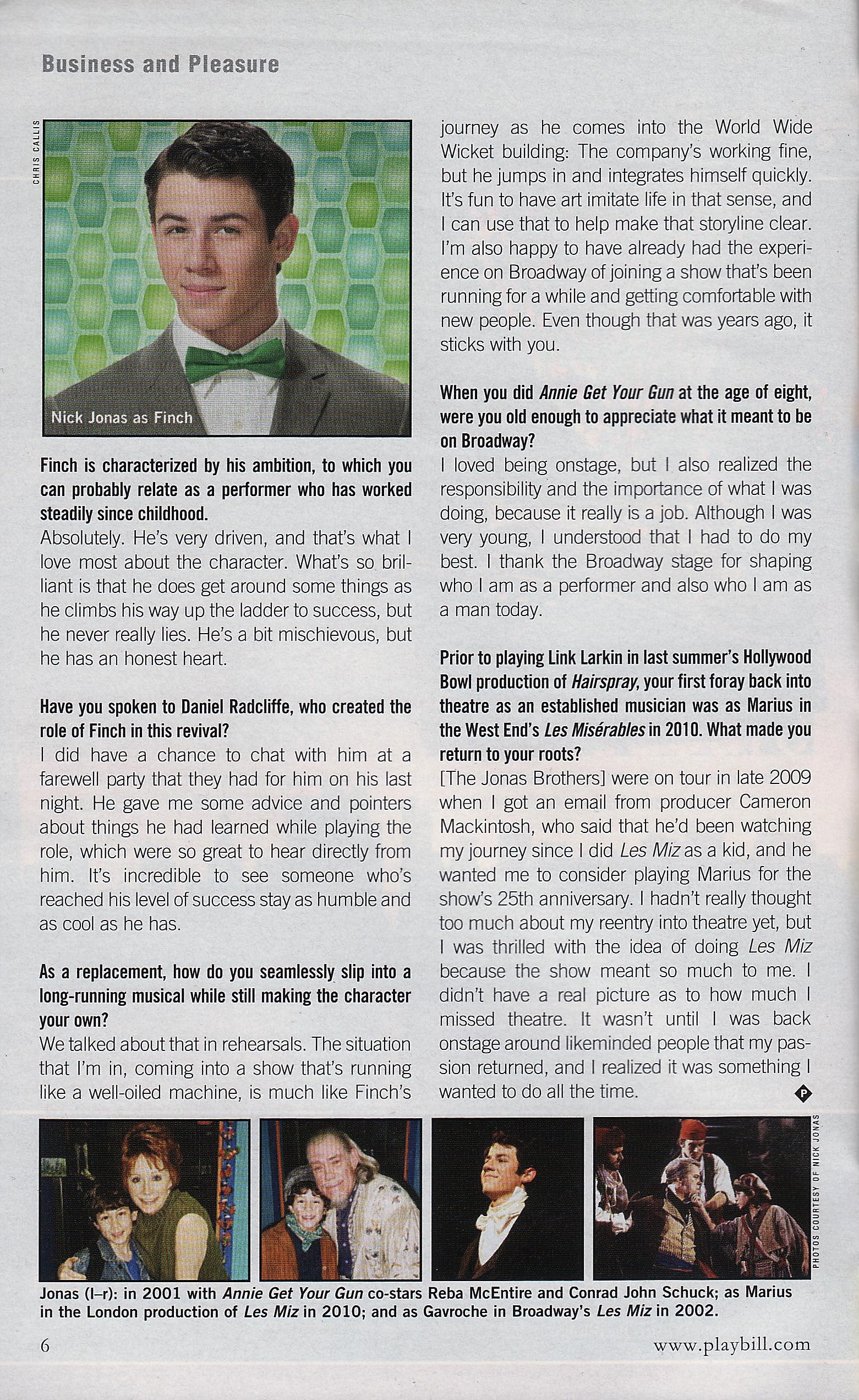Teen heartthrob Nick Jonas picks up where Daniel Radcliffe and Darren Criss left off in the revival of How to Succeed, but his Broadway success story began long before he joined the brotherhood of man.
By Brandon Voss
Pop star Nick Jonas, 19, has joined the cast of How to Succeed in Business Without Really Trying at the Al Hirschfeld Theatre, but loyal fans and longtime theatregoers know that Broadway musicals are old hat for the youngest member of the Jonas Brothers. Shortly after his Main Stem debut as Little Jake in Annie Get Your Gun in 2001, he played Chip in Beauty and the Beast and Gavroche in Les Misérables. Currently scheduled to star as How to Succeed's wily window washer J. Pierrepont Finch through July 1 (opposite fellow new cast additions Beau Bridges and Michael Urie), the former Disney Channel denizen explains how to succeed in show business — with or without reaching puberty.
By Brandon Voss
Playbill: Although How to Succeed is your fourth Broadway outing, it's your first since you've become an international pop star. Does it feel different this time around?
Nick Jonas: There is a bit of pressure, especially because it's my first leading role, but it's a good pressure that's inspiring me to do the best I can every performance. I see this experience as a homecoming. I was blessed to have done and become passionate about theatre at a young age, and I love that I could transition into recording music and touring, but I feel honored to be able to come back to Broadway.
Aside from your work with the Jonas Brothers, you also front the band Nick Jonas and the Administration. Will it be difficult to put your music on the back burner for the next six months?
The great thing about the Broadway schedule is that most shows during the week are at night, so I'll have those days to create, and I'm sure that playing this role and being onstage will inspire me.
Finch is characterized by his ambition, to which you can probably relate as a performer who has worked steadily since childhood.
Absolutely. He's very driven, and that's what I love most about the character. What's so brilliant is that he does get around some things as he climbs his way up the ladder to success, but he never really lies. He's a bit mischievous, but he has an honest heart.
What else have you discovered about Finch in rehearsals?
The interesting thing I've been learning about Finch is about how he keeps his outward thoughts directly in conversation. The statements he makes in the business world are what he maybe thinks he should be saying, and they're usually something your grandfather might've told you when you were younger, like, "I don't think a man should trade on a friendship for a job," and all these other Finchisms, as I like to call them. It's been exciting to find those moments and really underline them as important colors to the character.
Have you spoken to Daniel Radcliffe, who created the role of Finch in this revival?
I did have a chance to chat with him at a farewell party that they had for him on his last night. He gave me some advice and pointers about things he had learned while playing the role, which were so great to hear directly from him. It's incredible to see someone who's reached his level of success stay as humble and as cool as he has.
At 21, Radcliffe came under some criticism for perhaps being too young for the role. Meanwhile, you're only 19.
Finch is a window washer, so you have to think about the age a window washer would've been at that time, as opposed to the age of the other people who have played the role in the past. I think it's very age-appropriate casting that really works for this role, and it's exciting to tackle that. Daniel was the perfect age, and I believe that I'll be able to slip in there and hopefully do a good job too.
Radcliffe's immediate replacement, Glee star Darren Criss, plays Finch through January 22. Have you checked in with him?
I saw him just before he had his opening show, and he seemed to be doing well. I could tell he was really excited about getting up there onstage and just doing it. After you've rehearsed for some time — or for three weeks in his case — there's a certain point when you're just so ready to do it in front of an audience.
During these final two weeks of rehearsals, what do you see as your biggest challenge or obstacle?
I've been blessed to have a significant amount of time to get comfortable with the lines, so I feel comfortable in that sense. I started dance rehearsals back in L.A. in October just to start getting my body comfortable with some of the movement, and surprisingly, I feel pretty comfortable with the dancing too. Right now it's just about getting in there, trying a bunch of different things, and seeing what feels best in the different scenes. It's really about trial and error, and that's what it'll come down to for me. The rehearsals have been going really well.
Has this crunch-time rehearsal period been all work and no play?
It's a lot of work, but there's been a little bit of play, too. I rehearse all day, but I've had some time at night to catch up with some people and have some good dinners.
In addition to rehearsals, have you been attending any performances?
I might go see the show a few times later on down the road, once I'm more comfortable with the role. I've seen the show once before and I loved it, but I want to keep digging in so I can understand it all a bit more myself, and then maybe I'll go check it out again.
The stage door scene was sheer madness for Radcliffe and it continues to be crazy for Criss at the Hirschfeld. Are you prepared for that fan frenzy after every performance?
I'm interested to see what it's like. My fans and fans of the Jonas Brothers are very passionate, so I'm looking forward to seeing how they come out and support me in this. Knowing how important this is to me, I think they'll definitely show their support in a major way.
Tell me about working with director-choreographer Rob Ashford.
Rob Ashford is such an amazing guy. He's a really good person with a great heart, and he's a brilliant director with the ability to give you the perfect direction for that particular moment. Each thing that he says is perfect for what my questions are in my head; he comes up with the answers before I can ask them.
You'll perform opposite Beau Bridges and Michael Urie as boss J.B. Biggley and rival Bud Frump, respectively. Has it been easy to build chemistry with them in rehearsals?
Yeah, absolutely. As an actor, I think that it's really important to get to know Beau Bridges and Michael Urie first before I get to know their characters. Sitting down, having coffee together, and just getting an idea about who they are as people actually helps me understand their characters better. Luckily, we've had the opportunity at rehearsals to do that and get comfortable with one another.
Are you an Ugly Betty fan?
It was actually on TV the other night, so I turned it on and watched Michael Urie being hilarious, which was a good introduction before I met him and started working with him. Basically all of my rehearsals have been with Michael, and I can't wait to see the audience's reaction to how hilarious he is as Bud Frump. Both he and Beau have such a great sense of comedic timing, which is great to be able to work off of.
As a replacement, how do you seamlessly slip into a long-running musical while still making the character your own?
We talked about that in rehearsals. The situation that I'm in, coming into a show that's running like a well-oiled machine, is much like Finch's journey as he comes into the World Wide Wicket building: The company's working fine, but he jumps in and integrates himself quickly. It's fun to have art imitate life in that sense, and I can use that to help make that storyline clear. I'm also happy to have already had the experience on Broadway of joining a show that's been running for a while and getting comfortable with new people. Even though that was years ago, it sticks with you.
What was your earliest exposure to live theatre?
My first exposure to live theatre was at the age of 6, when my parents saw Les Miz on Broadway. They came back to our home in New Jersey and were raving about the show, saying how much they enjoyed it. I was always singing around the house, and I loved performing, so my parents said, "Nick, there's a role in this show that you could play, and you could definitely do that if you wanted." I think it was their faith in me that really spoke to me, but the idea of being able to perform every night was so exciting. So I listened to the music and I watched the DVD of the 10th anniversary performance, and I was just amazed. That was my first real introduction to theatre, and Les Miz was the first show I ever auditioned for when I was about 7 years old.
But your first Broadway credit was Little Jake in Annie Get Your Gun.
I actually got the national tour of Les Miz, but my mom was pregnant at the time with my little brother, so it didn't work out. Then A Christmas Carol at Madison Square Garden came up very soon after that, and that actually became my first show. Annie Get Your Gun came soon after that.
When you did Annie Get Your Gun at the age of 8, were you old enough to appreciate what it meant to be on Broadway?
I loved being on stage, but I also realized the responsibility and the importance of what I was doing, because it really is a job. Although I was very young, I understood that I had to do my best. I thank the Broadway stage for shaping who I am as a performer and also who I am as a man today.
After Annie Get Your Gun but before you began focusing on your recording career, you played Chip in Beauty and the Beast in 2002 and Gavroche in the final cast of Les Misérables in 2003.
That was an incredible time in my life. The more I did these shows and had the experience of going into the city every day, having a job that I loved at a young age, it continued pushing me to want to do more. But after doing Broadway for about three years, I was ready to take the next step, whatever that was. That's how recording music and touring came about: by feeling so satisfied with what I'd done on Broadway.
Prior to playing Link Larkin in last summer's Hollywood Bowl production of Hairspray, your first foray back into theatre as an established musician was as Marius in West End’s Les Misérables in 2010. What made you return to your roots?
We were on tour in late 2009 when I got an email from producer Cameron Mackintosh, who said that he'd been watching my journey since I did Les Miz as a kid, and he wanted me to consider playing Marius for the show's 25th anniversary. I hadn't really thought too much about my reentry into theatre yet, but I was thrilled with the idea of doing Les Miz because the show meant so much to me. There were times I'd go see a show, love it, and say, "One day I'll come back to this and it'll be great," but I didn't have a real picture as to how much I missed theatre. It wasn't until I was back onstage around likeminded people that my passion returned, and I realized it was something I wanted to do all the time.
Once you were open to more theatre opportunities, how did How to Succeed come about for you?
A few different things caught the attention of the producers, but I think Hairspray was sort of the main piece. It was incredible when I got the call that the producers were interested in having me be a part of the show, especially because my brother Kevin had just seen it and told me he loved it. He was like, "This is a show you have to do if you get the opportunity." I immediately went to New York and saw it, and I thought it was such an incredible show. I'm so honored that I was asked be a part of it.
Did you have any hesitations about accepting the role of Finch?
There was definitely some thought about how big of a commitment it was, because it means that I'll be here in New York for at least six months doing this show. I had to really think about that and make sure that this was what I really wanted to be doing. I also had to make sure that my fan base and my brothers were OK with it, but everyone was cool, and it all worked out. I'm so stoked to come live in New York and have this opportunity.
Which theatre roles would you like to tackle next?
I'm actually sort of covering my bases, and it's such a blessing. When it comes to dream roles, Marius was my main goal; even when I was very young, I knew that I want to play Marius someday. I also really love the movie version of How to Succeed with Robert Morse, and I always said that Finch was a role I wanted to play someday too, and now I'm able to. As far as roles for the future, I've been approached about some new projects that I think would be really exciting. A couple very interesting opportunities have come in post-Hairspray. It's just about feeling out which shows would be best and which roles I want to take on. I'm so blessed to be in the position I'm in, and I'm looking forward to the future.
Back to the subject of art imitating life, you recently shot a guest spot for NBC's Smash as Lyle West, a former Broadway child star who has achieved mainstream stardom as a young adult. More importantly, did you get to meet fellow guest star Bernadette Peters?
I didn't, unfortunately, because she was on the episode directly following mine. We keep missing each other, because she left Annie Get Your Gun before I came in; I did it with Reba McEntire. But we've got to run into each other at some point, right?
Playbill, February 2012; extended online version.



